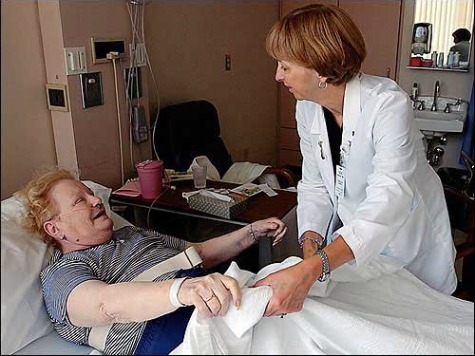
The National Institute of Health (NIH), part of the Department of Health and Human Services (HHS), has begun to solicit applications for federal grants to study ways to provide “palliative care” to older Americans at points earlier than end-of-life–including during time spent in assisted living facilities, short-term and long-term care facilities, and even ambulatory care.
“Palliative care” is specialized medical care for those with serious illnesses. Though this type of care can be given along with curative treatment for illness, its main focus is on providing patients with relief from the pain, symptoms, and stress of a serious illness rather than curing the illness or disease itself.
The Funding Opportunity Announcements (FOA) for the grants, which are worth up to $275,000, specifically state that they will be awarded for research on geriatric populations who are not in “hospice and end-of-life settings,” but, rather, “in settings and at time points earlier in geriatric patients’ disease of disability trajectories.”
One funding opportunity description notes:
As the population ages, the prevalence of diseases and conditions common in aging is also expected to increase. Dementia and cognitive impairment, cardiovascular disease, cancer, and chronic lung disease will likely continue to be the greatest sources of morbidity and mortality among older adults, as well as the costliest conditions to healthcare systems; however, the development of targeted interventions for specific chronic diseases has far outpaced the development of approaches to preserve the quality of life for patients living with such diseases.
The growing recognition that disease-specific management has failed to address the total health needs of patients with serious illness underscores the necessity to advance the science of palliative care.
The FOAs note that the “American population is currently experiencing unprecedented growth in numbers and in age.”
Additional guidance to applicants states:
Intervention studies may include traditional randomized controlled designs or more innovative approaches, such as adaptive designs. Low-cost pragmatic trials are particularly encouraged as they approximate more closely real-world practice. Studies that evaluate the effects of an intervention should define its specific parameters such that other investigators or providers may accurately replicate the intervention. For example, addition of expertise (e.g., academic detail, consultation, informal caregiver) or diagnostic method (e.g., geriatric assessment) should also include information about what specifically will be done and how subsequent management decisions will be informed. For any intervention study, applicants are encouraged to include patient-centered outcomes and, when possible, cost-effectiveness analyses.
NIH also provides some of its specific topics of interest. Among them are:
- Evaluation of discontinuing treatments hypothesized to be unnecessary in specific populations of older adults or in specific settings, and barriers to such discontinuation among patients and caregivers.
- Development and evaluation of novel strategies to improve advance care planning and/or articulation of treatment preferences among older adults.
- Development and evaluation of innovative decision aids for seriously ill older patients and/or their proxy decision-makers, such as prognosis calculators and communication of prognosis.
- Evaluation of new technologies for acquiring data about symptoms, quality of life, treatment preferences, and other variables not routinely captured as specific data elements in studies of older adults.
- Addressing systemic challenges in conducting research studies of palliative care in older adults, such as barriers to care, high rates of disability and mortality, and compliance among patients, caregivers/family members, and providers.
- Analysis of the effects of coverage policies of Medicare and other care funders on timely access to appropriate palliative care, and of the effects of care coordination, payment bundling, or other organizational and financing innovations on timely access to appropriate palliative care.

COMMENTS
Please let us know if you're having issues with commenting.